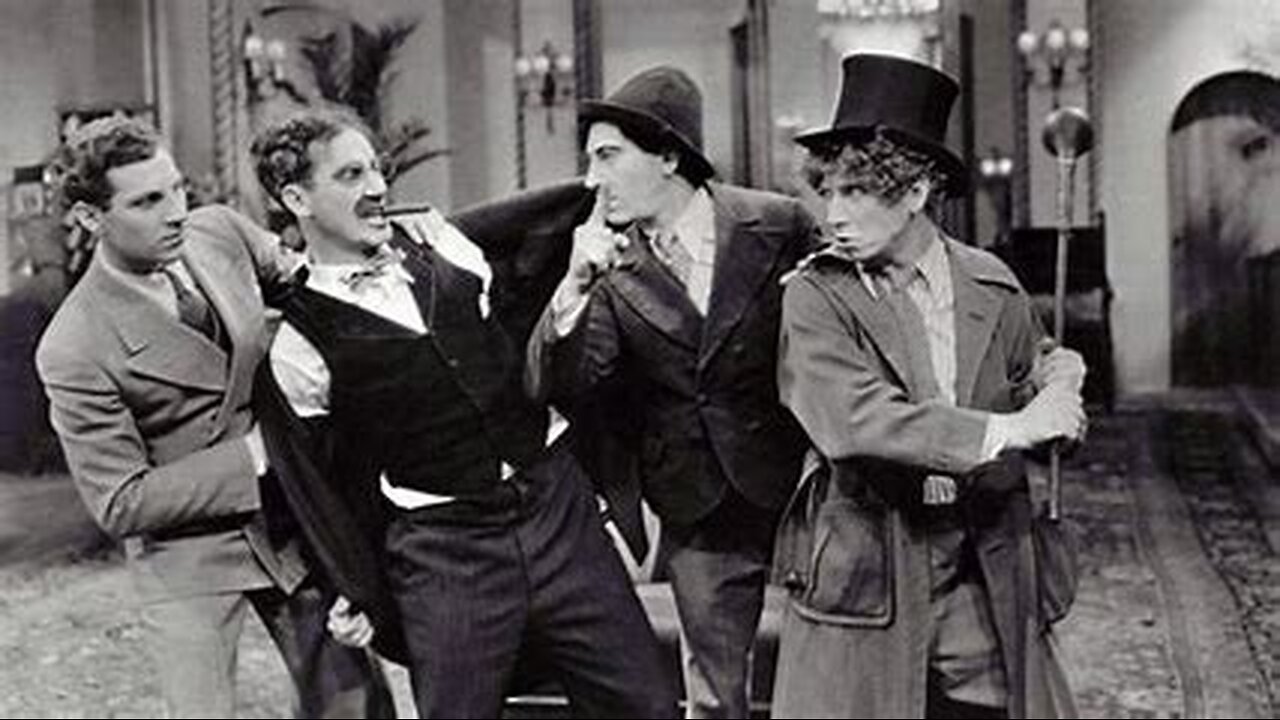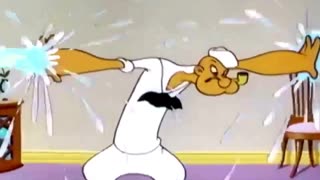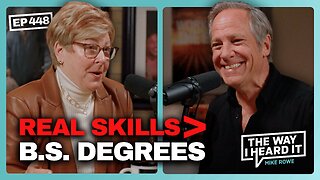Premium Only Content

The Cocoanuts (Comedy, 1929)
The Cocoanuts is a musical comedy with a heavy dose of slapstick and farce. It’s a quintessential early "talkie" that blends vaudeville-style humor, song-and-dance numbers, and the anarchic wit of the Marx Brothers, making it a landmark in the comedy genre.
Plot
Set during Florida’s 1920s land boom, the film follows Mr. Hammer (Groucho Marx), a shady hotel manager running the struggling Hotel de Cocoanut in Cocoanut Beach. He’s trying to unload worthless real estate on unsuspecting buyers while dodging his unpaid staff, who threaten to strike. His main target is Mrs. Potter (Margaret Dumont), a wealthy widow whose fortune he hopes to snag—either through land sales or marriage.
Meanwhile, two con men, Harvey Yates (Cyril Ring) and Penelope (Kay Francis), plot to steal Mrs. Potter’s diamond necklace. Adding to the chaos are Chico and Harpo Marx as bumbling freeloaders who stumble into Hammer’s schemes, and Zeppo Marx as Jamison, the hotel clerk caught in the middle. The romantic subplot involves Bob Adams (Oscar Shaw), a young architect, and Polly Potter (Mary Eaton), Mrs. Potter’s daughter, whose engagement is threatened by Yates’ frame-up of Bob for theft.
The plot careens through misunderstandings, a jewel heist, musical interludes, and a land auction, culminating in a chaotic costume party where the thieves are exposed, love triumphs, and Hammer’s schemes collapse in hilarious disarray. It’s less a tight narrative and more a vehicle for Marx Brothers mayhem.
Cast
Groucho Marx as Mr. Hammer: The fast-talking, wisecracking hotel boss with a penchant for insults and scams.
Harpo Marx as Harpo: The mute, horn-honking trickster who communicates through chaos and harp solos.
Chico Marx as Chico: The piano-playing Italian-accented schemer with a knack for mangling logic.
Zeppo Marx as Jamison: The straight-man clerk, playing the least zany Marx brother.
Margaret Dumont as Mrs. Potter: The dignified, oblivious foil to Groucho’s antics, a recurring Marx Brothers staple.
Mary Eaton as Polly Potter: The ingénue and romantic lead, a Broadway star of the time.
Oscar Shaw as Bob Adams: The earnest love interest and falsely accused hero.
Kay Francis as Penelope: The sultry femme fatale, in one of her early film roles.
Cyril Ring as Harvey Yates: The slick co-conspirator.
Directors
The Cocoanuts was co-directed by Robert Florey and Joseph Santley. Florey, a French-American filmmaker, brought a visual flair from his silent film experience, while Santley, a Broadway veteran, handled the musical and stage elements. Their collaboration bridged theater and cinema, though the Marx Brothers’ improvisations reportedly drove them up the wall.
Awards
The Cocoanuts didn’t win any formal awards—the Academy Awards were just starting (1929 was their first year), and comedies rarely got nods. However, it was a commercial hit, grossing over $1.8 million (huge for 1929), and it’s now celebrated as a classic. The American Film Institute (AFI) later recognized the Marx Brothers’ broader impact, ranking them #20 on its "25 Greatest Comedy Legends" list in 2000, with The Cocoanuts as their film debut.
Fun Facts
Stage to Screen: The film adapts the Marx Brothers’ 1925 Broadway hit of the same name, written by George S. Kaufman with music by Irving Berlin. Much of the dialogue and gags—like Groucho’s “Why a duck?” bit—came straight from the play.
Early Sound Chaos: Shot at Paramount’s Astoria Studios in New York, it was one of the first musical talkies. The clunky sound tech caused headaches—cameras were housed in soundproof booths, and the orchestra played off-screen, syncing live to the action.
Marx Improv vs. Directors: The brothers ignored the script, ad-libbing so much that Florey and Santley struggled to keep up. Groucho later quipped they “ruined the picture” with their antics, though fans disagree.
Harpo’s Harp: Harpo’s harp solo—a dreamy interlude amid the madness—was a Broadway holdover and a rare quiet moment, showcasing his real musical talent.
Florida Boom Satire: The setting pokes fun at the 1920s Florida land bubble, which crashed just before the film’s release, adding unintentional irony as the Great Depression loomed.
Technical Goofs: Early prints had sound issues—crinkling cellophane from candy wrappers (eaten by the crew) is audible in some scenes, a relic of primitive recording.
Berlin’s Songs: Irving Berlin’s score includes “When My Dreams Come True,” but a planned monkey-themed number was cut—though Harpo chasing people in a monkey costume stayed in.
Legacy
The Cocoanuts launched the Marx Brothers’ film career, cementing their brand of zany comedy and influencing generations of comedians. It’s rough around the edges—sound tech was new, and the plot’s a mess—but its energy and iconic bits (like Chico’s “viaduct/why a duck” exchange) make it a treasure. Preserved by the Library of Congress, it’s a snapshot of 1929’s transition from stage to screen.
-
 6:16
6:16
Silver Screen Echoes
1 month agoPopeye The Sailor Man: Floor Flusher (Cartoon, 1954)
621 -
 19:15
19:15
Stephen Gardner
16 hours ago🟢YES! Trump did it! + Elon Musk DROPS BOMBSHELL on Democrat Party!
12.5K75 -
 1:06:17
1:06:17
Mike Rowe
18 hours agoThe Mastermind Behind THIS Radical Idea At WSU Tech | Sheree Utash #448 | The Way I Heard It
70.1K9 -
 LIVE
LIVE
I_Came_With_Fire_Podcast
11 hours agoAncient Egypt's Tech & the Secret Temples of Malta
342 watching -
 LIVE
LIVE
GritsGG
1 hour agoWin Streaking! Most Wins 3499+ 🧠
186 watching -
 DVR
DVR
Bannons War Room
6 months agoWarRoom Live
34.1M8K -
 LIVE
LIVE
ttvglamourx
1 hour agoPLAYING WITH VIEWERS !DISCORD
96 watching -
 LIVE
LIVE
VapinGamers
1 hour ago $0.46 earnedTools of the Trade - Of Thumbnails and Titles, What's Important? - !rumbot !music
151 watching -
![Mr & Mrs X - [DS] Trafficking Empire – How Epstein Built His Web of Wealth and Deceit:Part 1 - Ep 5](https://1a-1791.com/video/fww1/f0/s8/1/o/k/J/d/okJdz.0kob-small-Mr-and-Mrs-X-DS-Trafficking.jpg) 52:11
52:11
X22 Report
3 hours agoMr & Mrs X - [DS] Trafficking Empire – How Epstein Built His Web of Wealth and Deceit:Part 1 - Ep 5
70.1K14 -
 1:13:18
1:13:18
Wendy Bell Radio
7 hours agoPet Talk With The Pet Doc
42.4K61